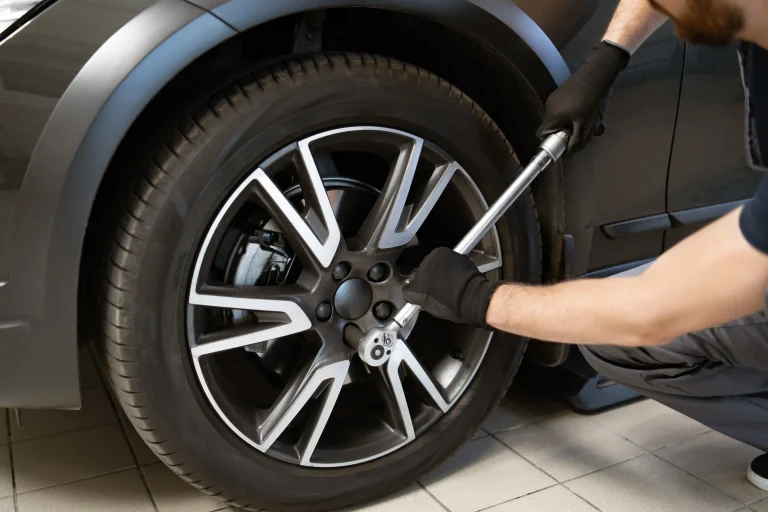Planning a long journey? Your alloy wheels face extra challenges during extended drives. Road salt, potholes, and heavy loads can all cause alloy wheel damage. The good news is that simple preparation and smart driving can prevent costly alloy wheel repair bills when you return home.
Why Long Journeys Are Tougher on Alloy Wheels
Extended driving creates unique problems for your alloy rims. When you drive for hours at motorway speeds, your tyres heat up more than usual. This affects fuel efficiency and puts extra stress on your wheels’ structural integrity.
Heavy loads and unfamiliar roads increase the risk of damage to alloy wheels. A single pothole that’s normally harmless can cause serious structural damage when you hit it at speed with a fully loaded car.
Pre-Journey Wheel Checks
Before you set off, spend ten minutes checking your wheels. This simple routine prevents expensive alloy repairs later.
Check Your Tyre Pressure
Always check tyre pressure before long trips. Check when tyres are cold (car hasn’t been driven for three hours). Your handbook shows the correct pressure.
For journeys with extra luggage, add 2-5 PSI to rear tyres if your handbook doesn’t give specific guidance. This helps handle extra weight safely and maintains braking performance.
Look for Existing Damage
Inspect each wheel for scratches, cracks, or chips. Minor damage can worsen during long journeys, especially if you hit potholes or scrape kerbs. If you spot any problems, consider our alloy wheel repair service before travelling.
Check Tyre Tread
Make sure tyres have plenty of tread. The legal minimum is 1.6mm, but we recommend 3mm for long journeys. Use a 20p coin to check – if you see the outer rim when pushed into the tread, replace your tyres.
Smart Driving for Wheel Protection
Your driving style makes a huge difference to preventing alloy damage.
Control Speed
Stick to speed limits and slow down in poor conditions. Higher speeds increase damage risk from potholes and generate more tyre heat, affecting your wheels’ structural integrity.
Keep Distance
Stay 2 seconds behind the car ahead (4 seconds in bad weather). This gives you time to spot and avoid hazards that could damage your alloy wheels.
Navigate Around Hazards
When you spot potholes, slow down steadily. If safe, steer gently around them. If unavoidable, hit them straight on rather than at an angle to reduce rim damage.
Be extra careful in car parks and service stations. Tight spaces and concrete kerbs are perfect for creating kerbed alloy damage.
Managing Your Load
How you pack affects your wheels’ safety.
Pack Smart
Keep heavy items low and central. This maintains balance and reduces stress on your alloy rims. Check your car’s maximum load capacity to avoid overloading.
Regular Stops
Take 15-minute breaks every 2 hours. Use these to walk around and check for any new alloy wheel damage. Feel each tyre – if one’s much hotter than others, you might have pressure problems.
Different Road Challenges
Motorways
Generally safest for wheels, but watch for debris. Keep distance from lorries as they throw up stones that can chip alloy wheels.
Country Roads
Often have more potholes and loose gravel. Reduce speed and be cautious around blind bends where road surfaces aren’t visible.
Urban Areas
More kerbs and tight parking spaces. Take time when parking and use mirrors to avoid kerbed alloy damage.
When Damage Happens
Despite care, damage can still occur.
Minor Scratches
Small kerb scuffs are common and usually safe. Note their location and arrange professional alloy repairs when home. Our repair and refurbishment services can restore your wheels to perfect condition.
Serious Problems
If you notice steering vibration or see cracks, this threatens structural integrity. Stop safely and inspect the damage. Don’t continue at normal speeds with cracked or badly bent wheels.
Find the nearest tyre service centre for professional advice. Damaged alloy wheels can affect braking performance and become dangerous.
After Your Journey
When you arrive, check wheels again for new damage. This is especially important for longer stays – you don’t want problems when driving home.
Clean off road salt, mud, and debris. These can cause corrosion if left on wheels. Our mobile alloy wheel repair and refurbishment service can help if you’ve picked up damage during your travels.
For comprehensive road safety guidance during long journeys, visit the government’s THINK! road safety advice website.
Professional Help When You Need It
At Alloy Fix, we specialise in comprehensive refurbishment and repair services. Whether you need diamond cut alloy wheel restoration or standard repair services, our team can restore your wheels to factory condition.
We understand that even careful drivers sometimes get kerbed alloy damage or pick up minor damage during travel. Our repair services include everything needed to refurbish your alloy wheels, from fixing structural damage to cosmetic improvements.
Our 3-year warranty on powder coating and diamond cutting shows our confidence in quality work. We’d rather help you prevent damage, but when repairs are needed, we’re here to restore your wheels properly.
Frequently Asked Questions
Should I increase tyre pressure for long journeys?
Yes, follow your manufacturer’s guidance. Many recommend slightly higher pressure for long trips, especially with extra load. Check your handbook for specific advice and never exceed maximum tyre pressure.
How often should I check wheels during long journeys?
Check every time you stop for fuel or breaks – roughly every 2-3 hours. This helps spot problems early before they become dangerous or expensive.
What if I hit a large pothole?
Stop safely and inspect wheels for cracks, bulges, or bends. Check the car drives straight without vibration. If you notice problems, get professional advice before continuing.
Conclusion
Long journeys don’t have to mean damaged alloy wheels. With proper preparation and careful driving, you can protect your investment and travel confidently. Remember, a few minutes of preparation can save hours of inconvenience and hundreds in alloy wheel repair costs.
Good preparation makes all the difference in avoiding alloy wheel damage. Safe travels!




